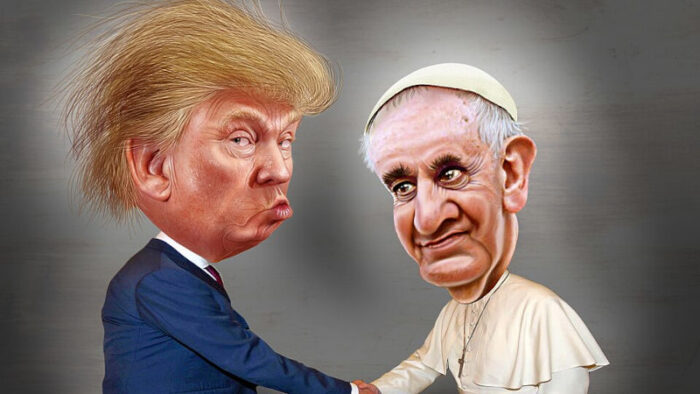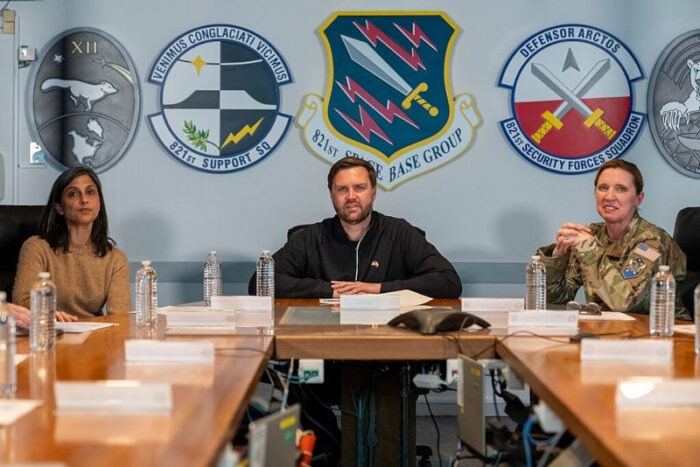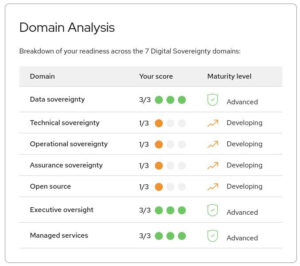Our man in Italy seems to think it might be a good idea if Pope Francis were to ask the Vice President a few pointed questions when he plays tourist at the Vatican on Easter.

Yesterday, US Vice President JD Vance landed in Rome to meet the Vatican’s Secretary of State and spend Easter Sunday in the Vatican.
Will Vance try again to explain that he is the Catholic who really gets what Catholic Catechism says about migrants, not the actual Catholic-in-Chief who made his disapproval of US treatment of migrants quite clear?
If you ask me, it’s unlikely the two will even meet. Pope Francis’ doctors won’t let him risk fits of laughter right now, and he is too good a diplomat anyway to needlessly mortify a foreign politician who hardly needs that kind of help.
But what if the Vice President of the United States and and Pope Francis met, specifically to discuss digital policy issues instead? After all, they would surely have something to discuss, and reasons to do it. I mean, just look at their resumes.
JD Vance is the expert in secure digital communications who has been heftily backed — allegedly just to keep an eye on the Oval Office — by one of the biggest apostles of techno-autocratic reality… that is by Peter “freedom and democracy are incompatible” Thiel.
As for Francis… think what you want of Catholics and religions in general, but remember one thing: “I’ll never listen to you because you don’t agree with me on everything” is exactly what brought much of the world, the US included, into the suboptimal situation it now occupies.
More explicitly, deliberately ignoring what any group says about technology only because you completely disagree on… let’s say, marriage, isn’t smart. Especially (“Know the enemy,” remember?) if it’s a group as intellectually powerful as some people say Catholics are, even in the US. At a minimum, careful consideration of Catholic points of view and proposals on digital technologies would be a powerful stimulus to realize that other solutions are possible besides Silicon Valley. Keep reading to know why.

Francis is the author of the Laudato Si’ encyclical, where he called for an integral ecology that “sees the interconnectedness of environmental, economic, political, social, cultural, and ethical issues.”
That’s really important for two reasons.
First, it’s basically the opposite of the “move fast and break things, because only tech matters” misanthropic blindness that produced mind-wrecking social media, fake innovation, a falsely unstoppable AI, and DOGE.
Second, because Catholics are anything but luddites, borrowing an idea or two from them doesn’t mean giving up on technology and innovation. As I argued in a long essay more than a decade ago, and recently summarized here, the vision of a really human economy and society that Catholic Social Teaching started proposing in the 19th century, is so advanced that technology only caught up with it in the last two decades. On top of that, that vision is also FOSS-friendly, as a consequence of the (not) surprising sympathy between Free Software and Catholic doctrine.
Finally, Francis also is the mind behind the recently issued Vatican guidelines about Artificial Intelligence titled Antiqua et Nova. Since “the very use of the word ‘intelligence’ in connection with AI can prove misleading,” those guidelines strongly recommend that:
- “the ends and the means used in a given application of AI, as well as the overall vision it incorporates, must all be evaluated to ensure they respect human dignity and promote the common good.”
- “attention needs to be given to the nature of accountability [and] it is essential to identify the objectives given to AI systems”
There! Isn’t this refreshing, and a bit more mature than the power trips of toddlers only able to recreate themselves, not “AI”?
Considering all this, here are a few questions about digital policies that I’d love to see Pope Francis ask JD Vance:
Dear Catholic Vice President…
- Why doesn’t your country fights “unduly rigid assertion of the right to intellectual property” as your Pope Benedict recommended?
- Back in 2020, your Church issued a “Calls for Ethics in AI” that only applied to Big Tech, but it’s painfully obvious now that Big Tech just ignored it. Since it’s the meek who shall inherit the earth, we are going to try again with them now. Are you game?
- Every worker, said St. John Paul II, should be able to “consider himself a part-owner of the great workbench at which he is working with everyone else.” Will you help gig-economy workers to be part-owners of the algorithms that mystify them for too little money in exchange?
- Maybe Bitcoin is the only currency that “fully embodies the Church’s social teachings” and maybe it isn’t. We Catholics do need more thinking about cryptocurrencies. Still, I read that the specific way that Mr. Trump and you are approaching them may worsen both “criminal activity and financial markets.” Can you prove me wrong?
- I said two years ago that making a person’s life depend on an algorithm is unacceptable, and repeated just yesterday that economies built on calculation and algorithms are inhuman. Will you please pass that to your boss? No, not the President! Your other boss, the one whose company just got tens of millions for “Complete Target Analysis of Known Populations.”

Marco Fioretti is an aspiring polymath and idealist without illusions based in Rome, Italy. Marco met Linux, Free as in Freedom Software, and the Web pre-1.0 back in the ’90s while working as an ASIC/FPGA designer in Italy, Sweden, and Silicon Valley. This led to tech writing, including but not limited to hundreds of Free/Open Source tutorials. Over time, this odd combination of experiences has made Marco think way too much about the intersection of tech, ethics, and common sense, turning him into an independent scholar of “Human/digital studies” who yearns for a world with less, but much better, much more open and much more sensible tech than we have today.






